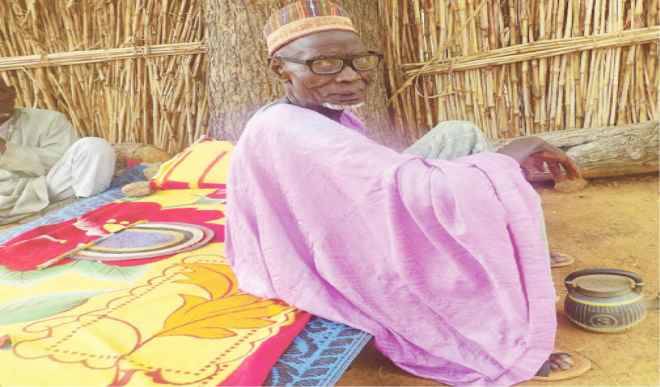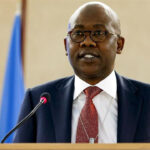
The one thousand or so residents of Amanawa Kamfani are special. They are mostly characterised by clawed fingers, deformed facial features, damaged skins and nerves. All of them came to Kamfani to seek treatment for leprosy. Over the years, escaping the stigma that comes with the disease, they made Kamfani a permanent home and have never looked back.
Amongst the inhabitants, Samaila Mainasara, 75, has emerged the leader of the community with the title of Maigari. Speaking to Daily Trust, he revels in the independence of their community from Amanawa, which has hosted Kamfani since its establishment during colonial times.
“We don’t have to report anything to the village head of Amanawa,” he said. “If matters arise, we report directly to Sarkin Bauran Dange or Araba Shuni, the District Head of Dange or the District Head of Shuni,” Mainasara said.
Early days
The story of Amanawa Leprosarium, now Infections Diseases Hospital, and Amanawa Kamfani are intertwined.
It is a place set up by missionaries in Amanawa who were mindful of the need to create a place where patients could receive care over long period until they are healed enough to return to their communities.
Some of the patients went there as early as when they were seven years old while others were teenagers and adults. After they were cured, some of them went back to their homes while others decided to remain at Kamfani. Some have never left since.
Some no longer remember their roots, and do not have any other home but Kamfani while others simply preferred to stay back there where they would not suffer discrimination.
“You know we face stigmatization in the midst of others in the society. Even our relations do not want us close to them, they don’t feel safe with us around them, so we rather stay here to escape stigma. We feel safe and content here,” Mainasara said.
He hails from Arawa, Ambarura District in Ilela Local Government area of Sokoto but had been in Kamfani since the days of the missionaries.
“Missionaries handed over the leadership of Kamfani to me in 1975 when they were leaving for their country, England. But some of the missionaries remained behind and continued working with us. That was during the reign of Sultan Abubakar, the father of the present Sultan. This land was bought from indigenes by the then Sultan Hassan Dan Muazu and it is 105 years old today,” he said.
Mainasara recalls with nostalgia how things were during the time of the missionaries, when they were guaranteed three square meals and proper medical care before being sent to Kamfani for residence until totally cured.
“A patient reported to the hospital either daily or weekly. The missionaries even chose among the patients and gave us work to do for them. They paid us on weekly basis. The kind of work we did was to maintain security, cleanliness or split firewood, which was used to cook for patients, and to maintain sanity and order. They appointed Maigari, village head, a judge who address cases of adultery, assault and theft and other wrongdoings.”
He remembered the uniform that patients used to wear and how on completion of treatment, the missionaries organised send forth ceremonies for about 100 cured leprosy patients
“After being cured, a patient’s belongings are returned to him,” he said. “They also gave him a gift and transport fare back to his or her destination. During a patient’s stay, they made life so easy for him.”
It was treatment like this, Mainsara recalled, that saw the numbers of residents and patients rise as those who were cured and returned to their communities encouraged others with the disease to come for treatment as well.
Patients came from all across Nigeria and neighbouring countries of Niger Republic, Mali and Burkina Faso. This, he said, explained the diversity in the people living today in Amanawa. The community ties have been improved with intermarriages over the years.
However, the diversity is limited. Almost all those in the colony are Muslims. The Christians among them had since left, almost immediately after the missionaries departed.
While this has its drawbacks, Mainasara said it has helped made things easier in some ways.
“We organise our marriages here. Anyone can get married to a female resident of his choice regardless of tribe or ethnic leanings. We are all Muslims. We follow strictly all rules and regulations guiding marriage in Islam and we settle marriage cases amicably, which gives room for peaceful coexistence and harmonious relationships existing here,” he said.
How they came
A resident of Kamfani, Malam Umar Kasha Rana, 78, from Talata Mafara in Zamfara State, had spent over 40 years in Kamfani.
“I was invited to Amananwa by one Kwazo from our village. He also had the disease and he told me about the place and my relations agreed to allow me try my luck. I got married here because I met my wife among the admitted patients at the female section. Though she is now deceased, we have 12 children,” he said.
Malama Asshibi Garba, 60, had been living at Kamfani for 20 years. She too found love there and married. That union produced a child.
Though she has separated from her husband, she expressed hope of reconciliation with him.
Others such as Malam Amadu Maigarin Bagirbe stay only occasionally at Kamfani.
Amadu hails from Gada Local Government Area. He was diagnosed with leprosy since he was 15. “I don’t live in Kamfani as a permanent dweller but do stay up to eight months before I go back home,” Amadu explained. He had come again to see the doctor at the hospital.
The octogenarian laments the damage leprosy had inflicted on him.
“I can’t see with my right eye and even the left one is not okay. The vision is blurred,” he said.
There were also newcomers like Danladi Amali, 60, from Tambuwal Local Government. He had only spent a few weeks at Kamafani and was nursing his throbbing leg. He has no plans to stay as he hopes to return home as soon as his legs got better. But already, he has formed an opinion of Kamfani.
“People here are kind to me and the place is cool and tranquil, good for patients like me,” he said.
Asked about living in Kamfani, Amali laughed and said, “My family is anxious for my return.”
The serenity he refers to may have something to do with the trees that populate Kamfani. Dwellers here are mostly farmers and animal rearers. Most of them pay for labour since they cannot cope with the physical aspect of farming.
They also enjoy N6,500 monthly stipends provided by the state government to physically challenged persons in the state. Some of them, who hitherto engaged in begging, have abandoned it for petty trading.
NGOS and international humanitarian bodies have also introduced vocational training to them especially the women who aspire to be self-reliant. Such public-spirited organisations have also assisted in the provision of water, food and clothing, among others at some point.
But not all residents are content with the allowance they are paid. Some have continued to engage in begging. Leaving their residence at Kamfani, they sit by the roadsides all day, begging for alms.
But even among the residents, this practice is frowned at. Asshibi, who is the chairperson of Women Lepers said as much.
“Many of us are into petty trading of plastic materials, toiletries and other things. We make good use of the N6,500 stipends we receive from the Sokoto State government. The ones you see at the roadside begging for alms are ingrates.”
Illiteracy and poverty are noted as factors which contribute to the prevalence of begging.
Chairman Sokoto Lepers Association, Malam Umaru Kasha Rana, said the state government often gives them items such as rice, millet, sugar especially during occasions such as Ramadan, partly from the monthly N6,500 stipend which he confirms they get regularly.
“The association gives priority to members’ welfare. We buy drugs for members who are sick and cannot afford to buy them. We also pay for cured patients’ transport fare back to his people now that the missionaries are no longer here. The association also pays dowry for any member who cannot afford to do so and needs to get married. We assist members during their naming ceremonies.”
The Kamfani community faces some challenges which the Maigari explained are in the areas of water, electricity and some aspect of security. “The whole area is without demarcation except at the main entrance by Sokoto-Gusau Road.”
There are also calls for the rehabilitation of their dilapidated rooms at Kamfani.
“Anytime it rains, we face a lot of problems from leaking roofs,” one of the residents lamented.
The community head made a passionate appeal to relevant authorities to hasten the reactivation of the broken down borehole, the restoration of regular electricity supply to Kamfani and address other concerns.
Perhaps, a noteworthy aspect of the Kamfani community is the fact that none of the children carries any sign of the disease even as the parents are still battling the scourge. Their children look heathy and well taken care of.
The Maigari has two wives, both lepers, 14 children, none of whom has leprosy. Neither these nor his over 100 grandchildren have leprosy.
All the children of Lepers at Amanawa Kamfani are living a normal life, like children elsewhere.
The parents enrol them for Islamic education in their early years and later western schools where they compete favourably with other children outside the ‘colony’.
Many of the female children of the lepers marry outside the colony, especially with men from Dange, Amanawa and even farther afield. The males among them also seek hands of children whose parents never had leprosy.
“I have never for once seen myself as different,” Masud, 25, said. “By the time our parents gave birth to us, they had been completely cured after receiving medication. So we don’t see them as anything different from other parents. Their deformed limbs, legs and other body parts notwithstanding, they did not abdicate their responsibilities. They enrolled us in Islamiyyah and primary school for Islamic and Western education, which we did successfully.”
“I never for once nursed any feeling about the health challenges of my parents and they never gave us any cause to feel different with the kind of love and care they give us which we are still receiving despite the fact that we are in our adolescence,” he said.
Mas’ud, who is currently studying at Sultan Abdurrahman College of Health Technology, Gwadabawa, said, “At tertiary level, I am relating normally in school as no one knows from where I come. Those who don’t know us could not know from where we come from or who our parents are.”
Mas’ud is one of 14 children all born to his father’s two wives.
According to Mas’ud, in the 70’s and early 80’s there were stigma all around the colony. “People of the neighbouring villages called us names, such as settlers or resident communities, they teased us that we were living in a place not our own and which belongs to the hospital. All this has diminished with time.”
Mas’ud’s elder brothers, Alhaji and Abdullahi, are both married from within the colony but he said they could equally seek marriage to women from their villages. “At Kamfani, we are all one. No discrimination.”
Mu’azu, another person born in Kamfani, shared the view.
“At the colony, we are not missing anything as the environment is peaceful and conducive for living. We thank our parents for giving us the care and love which enabled us to compete favourably with other children from different background,” he said.
“One day, we would look for a place of our own where we would settle down to normal family life after we get married at the end of our studies and when we secure employment,” Muazu said.




